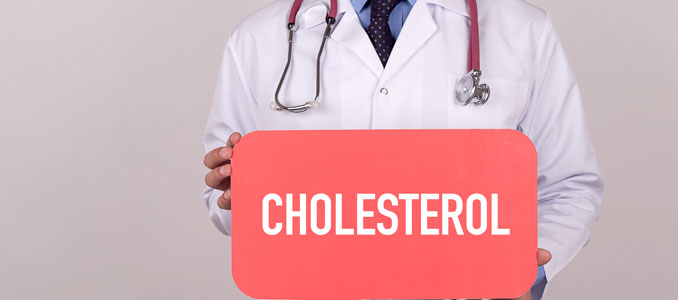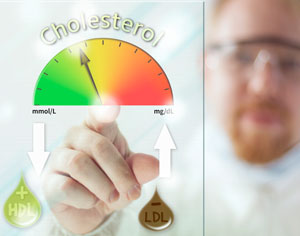The Connection between Cholesterol and Testosterone Levels

When we age, our bodies go through many changes. Younger adults typically have better cholesterol and testosterone balance than older adults. By the time we leave our twenties, testosterone levels are already declining, albeit at a very slow rate. At the same time, cholesterol levels may begin to change.
For many people, cholesterol and testosterone production does not become a problem for at least another decade, or longer, depending on numerous factors. Health, sleep, nutrition, and exercise can all influence testosterone production and cholesterol levels.
A study of cholesterol and testosterone levels in older men in 2015 found that there is a strong link between heart attacks and cardiovascular risks and low testosterone levels. Continue reading to find out more about this connection.
With age, testosterone levels decline, and cholesterol balance begins to change.
What Is Cholesterol and How Does It Influence Testosterone?

The simple truth is that your body needs these hormones to support healthy brain and heart functions. Bone density, muscle mass, sex drive, metabolism, and more require these vital chemical messengers. That is why maintaining healthy dietary cholesterol, and testosterone levels are so important. Without cholesterol, you would rapidly suffer hormonal decline. If your body does not have enough cholesterol, it cannot undergo conversion into vital hormones.
As we look closely at testosterone and cholesterol levels, we find that your blood contains two different types of cholesterol
- LDL Low Density Cholesterol – LDL cholesterol is often called bad cholesterol. However, you need a certain amount of it as this is the basis for pregnenolone – the precursor hormone to progesterone, testosterone, cortisol, DHEA, estrogen, and other essential hormones. Through a series of enzymatic conversions, we eventually arrive at testosterone from what was once cholesterol. Too much LDL cholesterol is what you do not want as it can clog the arteries.
- HDL High Density Cholesterol – HDL cholesterol is called the good cholesterol. It helps sweep LDL cholesterol from the bloodstream, taking it to the liver for subsequent filtering from the body.
A crucial connection between cholesterol and testosterone levels is whether your LDL and HDL levels are high or low. It is a well-known fact that low HDL and high LDL levels are bad. That is what puts you most at risk for cardiovascular risks.
Of course, the reverse situation is having high HDL and low LDL levels. That is considered the best option because you know that the high-density lipoproteins are removing the low-density lipoproteins from your bloodstream.
What about if both HDL and LDL levels are high?
That is where the question is still in debate. At one point in time, doctors believed that only low LDL levels were good. Today, we believe that having both levels high, especially if triglycerides are low or normal, is fine. The higher HDL levels still help to keep LDL levels from getting out of hand.
Cholesterol is a fat-like substance that is the precursor to the production of testosterone and other essential hormones.
How Does Testosterone Influence Cholesterol Levels?
As testosterone levels drop with age, so to do LDL cholesterol levels often rise. For many people, the body naturally adjusts to changes in hormone production. However, for others, that is not the case. Some people suffer from low testosterone and high cholesterol, which can lead to many health problems, including cardiovascular disease.
When you are young, testosterone exerts protective benefits on heart health. Unfortunately, as you age, changes in cholesterol and testosterone levels put you at risk for high cholesterol, atherosclerosis, cardiovascular disease, metabolic syndrome, and more.
It is also crucial that we want you about cholesterol medication and low testosterone. Statin drugs, useful for lowering cholesterol, also lead to further depletion of testosterone levels. Without the necessary cholesterol that serves as the basis for testosterone and other hormones, you could easily wind up with Low T.
Does that mean that testosterone can influence cholesterol levels?
Yes, by increasing testosterone, we often find that improved HDL to LDL ratio occurs, helping to improve blood cholesterol levels.
As testosterone levels drop, LDL cholesterol levels start to climb. By increasing testosterone, we can often improve LDL to HDL cholesterol ratios.
Testosterone, Cholesterol, and Atherosclerosis
It should come as no surprise that there are mixed opinions on testosterone and cholesterol. On the one hand, your body needs cholesterol to synthesize numerous essential hormones. On the other hand, having an excess of LDL cholesterol in the bloodstream can lead to plaque formation in the arterial walls. As the plaque sticks to the walls of the arteries, it hardens. This is called hardening of the arteries or atherosclerosis.
Looking at the connection between cholesterol and testosterone levels, we find that the more plaque you have, the more blocked the arteries become. Blood circulation begins to suffer. As that occurs, numerous health issues may develop. If a coronary artery suffers from plaque buildup, it could reduce circulation enough that chest pain (angina) occurs.
Another problem between high cholesterol and testosterone levels is that if a piece of that plaque breaks free, it could lead to arterial blockage, heart attack, or stroke.
Excess LDL cholesterol buildup in the arteries can lead to atherosclerosis.
What Does Testosterone Treatment Do for Cholesterol?
Deciding between cholesterol and testosterone treatment is not always easy. You may have your general physician or cardiologist telling you to use statins to bring down your LDL cholesterol levels. Some doctors believe that statin use is too high in this country and that those medications cause their own set of problems. We agree that statins are not the best choice for everyone.
We know there is a connection between cholesterol and testosterone levels; that is why looking at testosterone therapy might be the answer. Although research is not 100% definitive in one direction, there are many substantial studies that show benefits of testosterone for lowering LDL cholesterol and triglycerides. Changes in HDL have been either minimal or not much of a difference. That is not a problem as the whole purpose is to lower LDL cholesterol levels, which testosterone appears to do for most people.
For further information about testosterone therapy and cholesterol, please contact National HRT for a free consultation.
The use of testosterone therapy can help reduce LDL cholesterol levels for most people.


